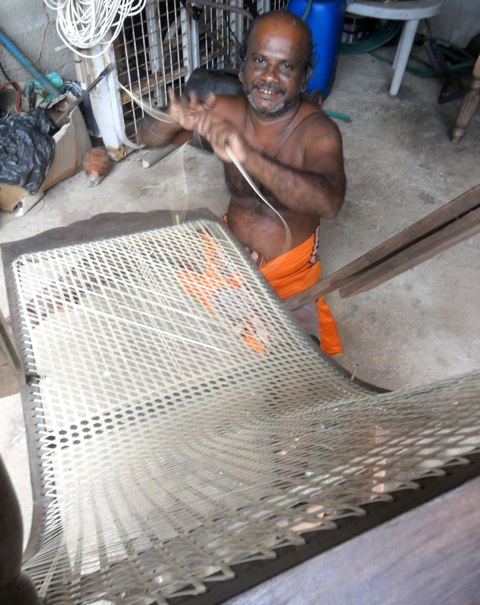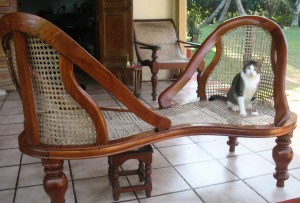Sri Lanka Roundabout (Number 2) – The Rattan Man
by · Published · Updated
A weekly look at Sri Lanka for Jetwing by Royston Ellis
Welcome to Jetwingers around the world to this week’s issue of my regular Jetwing newsletter about in Sri Lanka.
The Rattan Man
Furniture in Sri Lanka, the same as digital devices like laptops and televisions, needs constant care and attention to protect it from the elements. Rattan chairs, while being cool, comfortable and practical for tropical living, need their rattan renewed periodically. Rattan refers to the thin, dried strips of vine-like palms with which seats are woven.
While I prefer original rattan upholstery for my furniture at home, it has become prohibitively expensive, so we have to make do with a plastic version made in Sri Lanka. There are various grades but the cheaper grades are not worth purchasing, unless one wants the rattan man to visit every month to repair chairs again.
 This rattan man lives in Boosa, near Galle and uncannily seems to know when his services are needed for the score of rattan upholstered chairs, including a love seat and the planter’s chairs that I have at home.
This rattan man lives in Boosa, near Galle and uncannily seems to know when his services are needed for the score of rattan upholstered chairs, including a love seat and the planter’s chairs that I have at home.
 His is a dying art that he learned from his brother, who himself learned the technique in Jaffna. He has been repairing chairs for 34 years since he was 18, and has taught his brother-in-law, who lives in Negombo, the secrets of the craft too. The plastic strips he now uses instead of genuine rattan cane are manufactured at a small factory at Pasyala, close to the road to Kandy, near the town where wicker work furniture is sold.
His is a dying art that he learned from his brother, who himself learned the technique in Jaffna. He has been repairing chairs for 34 years since he was 18, and has taught his brother-in-law, who lives in Negombo, the secrets of the craft too. The plastic strips he now uses instead of genuine rattan cane are manufactured at a small factory at Pasyala, close to the road to Kandy, near the town where wicker work furniture is sold.
In Plate’s Ceylon Annual published in 1938, I came across this surprising anecdote: “Who could be more harmless than the rattan man? With his bundle of fine-trimmed strips of cane under his arm he would visit us periodically to repair the seats of the chairs and sofas, and if you were innocent and assessed his honesty by his looks, you allowed him to work on the long verandah amongst all the other chairs.
“Humbly, he would finish his work and go, but some days later sound chairs would commence to crack and tear in a most unaccountable manner. Puzzling, that is to say, until you came to know the rattan-man and his little trick of slipping his knife in amongst your sound chairs when he saw nobody was looking.
“But give him the chair he has to repair, making him work on it out in the garden, and a good job he would turn out, for he knew that you knew, and respected you for it.”
Royston Ellis (www.roystonellis.com) is a British author resident in Sri Lanka since 1980.




